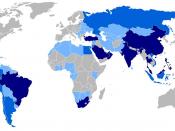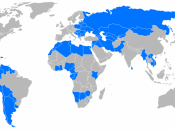Executive Summary
The Relative Impact of Trade Liberalization on Developing Countries
It has become a standard refrain in policy circles that expanded trade holds the key to prosperity for developing countries. According to this view, if the industrialized countries would eliminate their trade barriers, especially in apparel and agriculture, this would provide a basis for growth in developing countries, pulling hundreds of millions of people out of poverty. As the World Bank wrote in its latest Global Economic Prospects: "A reduction in world barriers to trade could accelerate growth, provide stimulus to new forms of productivity-enhancing specialization, and lead to a more rapid pace of job creation and poverty reduction around the world" (World Bank 2002, p xi).
The evidence for this view is considerably less compelling than its proponents imply. While there are certainly reasons for believing that expanded trade can help to promote growth in developing countries, it is unlikely that trade liberalization, by itself, will qualitatively improve the plight of people in the developing world.
In fact, there are plausible scenarios in which trade liberalization can actually lead to worse outcomes for developing countries.
Moreover, it is not clear that trade liberalization is the key to rapid growth and development. It is worth noting that the major success stories in the developing world--most notably South Korea and Taiwan, which now have income levels comparable to the poorer industrialized countries--but also countries that have more recently experienced accelerated growth rates, such as China and India, have not followed a simple path of trade liberalization. In all of these countries the government has played an important role in guiding the economy. This guidance has included subsidies and protection for favored industries and restrictions on capital flows, policies generally opposed by the leading proponents of trade liberalization. In many respects,


